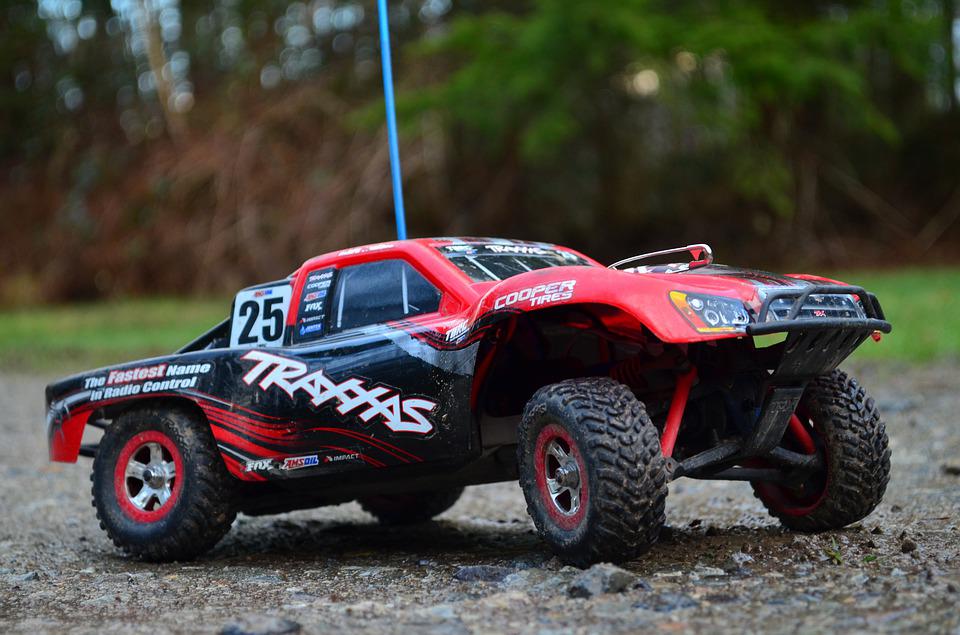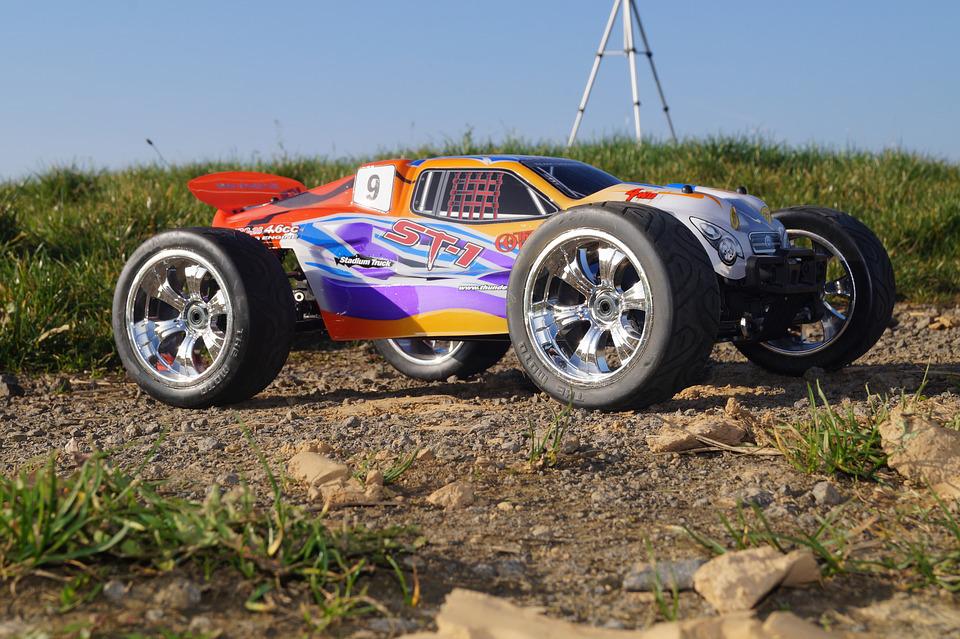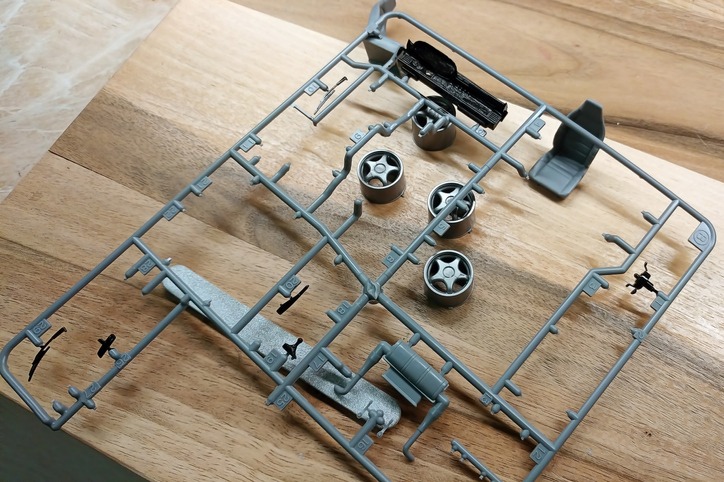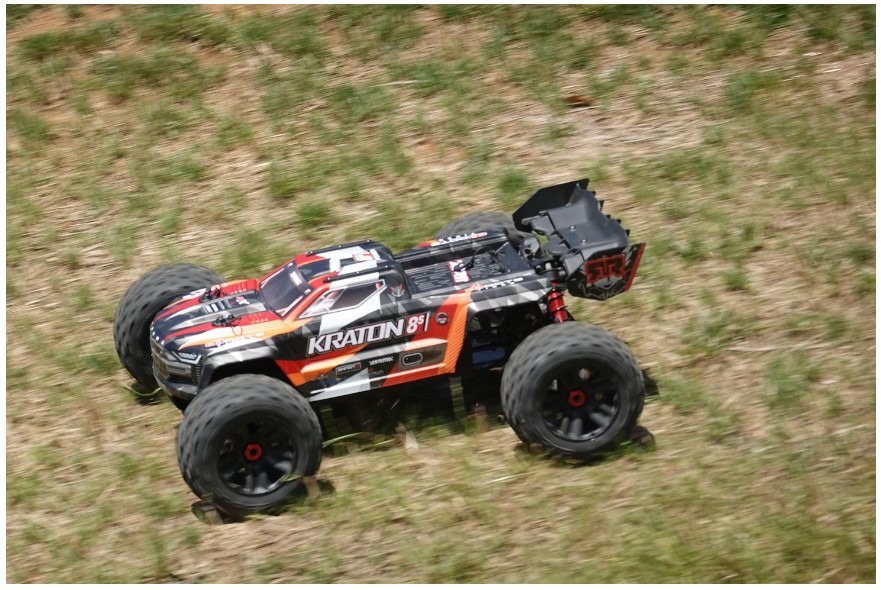What Speeds Can an RC Car Reach?
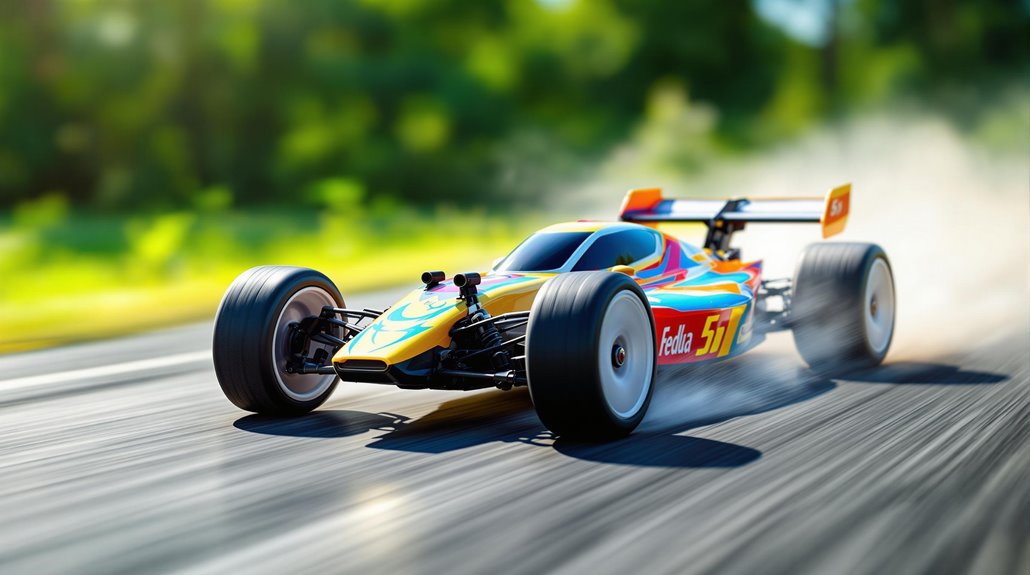
RC cars can hit speeds from 10 mph in toy-grade models to an impressive 202.02 mph, like the record-setting RC Bullet. Typically, commercial models reach between 30 and 70 mph, while high-performance options such as the Traxxas XO-1 can zipper past 100 mph. If you want speed, consider modifying your car with brushless motors or higher voltage batteries, which can significantly boost performance. Nitro models usually top out around 60 mph, but with upgrades, some can exceed 100 mph. Curious about the fastest options and how to enhance your RC experience? There's plenty more to discover!
Key Takeaways
- The current speed record for an RC car is 202.02 mph, set by Nic Case in 2014.
- Fastest commercially available models like the Traxxas XO-1 can reach 100 mph in just 5 seconds.
- High-performance electric models, such as the ARRMA LIMITLESS, can achieve speeds of 150 mph.
- Nitro RC cars typically reach speeds between 30-60 mph, with modified models exceeding 100 mph.
- Toy-grade models generally have lower speeds, averaging between 10 to 20 mph.
Fastest RC Car Records
When it comes to speed, the world of RC cars boasts some incredible records that will leave you amazed. The current record for the fastest RC car is an astonishing 202.02 mph, achieved by the RC Bullet, piloted by Nic Case in 2014. This record highlights just how thrilling the pursuit of speed can be in the RC community. Among the fastest RC cars, the ARRMA LIMITLESS stands out with impressive top speeds of 150 mph, especially when pitted against a Formula One car in head-to-head contests. It's not just the elite models that impress; high-performance nitro RC cars like the Schumacher Menace can also reach speeds of 70+ mph.
If you're diving into the hobby, many commercially available models typically hit speeds between 30 to 70 mph, designed for various racing styles. However, with the right upgrades and modifications, you can easily push hobby-quality RC cars to achieve speeds ranging from 70 to over 100 mph. Whether you're a beginner or a seasoned racer, the quest for speed in RC cars is always exciting! Among the fastest, the Traxxas XO-1 is regarded as the world's fastest commercially available RC car, capable of reaching speeds up to 100 MPH in just five seconds.
Speed Categories for RC Cars
RC cars come in a wide range of speed categories, allowing enthusiasts to find the perfect model for their racing preferences. You can expect speeds to vary significantly, with options available at 30, 40, 50, 60, and even 70+ MPH. For off-road racers, the top speed tends to be lower due to their design, which prioritizes durability and handling over sheer velocity.
If you're into drag racing, you might find that these RC cars focus more on rapid acceleration than maximum speed, delivering impressive starts without necessarily hitting high top speeds. For those seeking serious thrills, hobby-grade RC cars can be modified to exceed 100 MPH, making them a popular choice among speed enthusiasts.
On the other hand, toy-grade models typically average speeds between 10 to 20 MPH, which makes them a great choice for beginners. If you're looking for the fastest commercially available option, the ARRMA LIMITLESS stands out, achieving speeds over 110 MPH with the right setup. Brands like Traxxas and HPI Racing have been instrumental in developing advanced RC vehicles, offering a variety of models to suit different speed preferences. Whatever your preference, there's an RC car speed category that suits your racing style!
Factors Influencing Speed
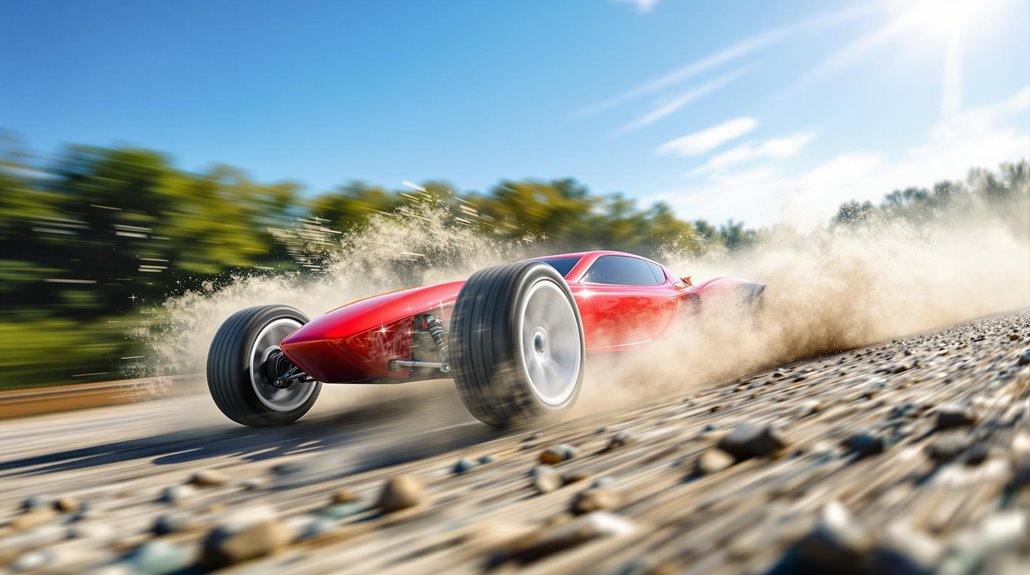
Several key factors influence the speed of your RC car, and understanding them can help you maximize performance. Here's what you need to consider:
- Motor Type: The type of motor you choose significantly affects speed. Brushless motors typically provide 10-15% more efficiency and power compared to brushed motors, giving you that extra edge on the track.
- Battery Voltage: The voltage of your battery is crucial. Higher voltage batteries can increase your car's maximum speed by several miles per hour, allowing for quicker laps and better racing times.
- Gear Ratios: Gear ratios, which are determined by the sizes of the pinion and spur gears, play a vital role in your car's performance. They can be adjusted to enhance either acceleration or top speed, depending on your racing needs.
- Tire Type and Condition: Lastly, the type and condition of your tires directly impact speed. Slick tires work best on smooth surfaces, while spiked tires excel in wet or muddy conditions, affecting grip and overall speed.
- Surface Type: The surface type you drive on can significantly impact the speed and handling of your RC car, with smoother surfaces typically providing a better racing experience.
Modifications for Increased Speed
To unlock the full potential of your car's speed, consider making specific modifications that enhance performance. One effective upgrade is switching from brushed to brushless motors. This change can boost your speed performance by 10-15%, thanks to the increased efficiency and power of brushless systems.
Another great modification is to adjust your tire choice. Opting for slick tires on smooth surfaces can significantly improve traction, resulting in faster acceleration. Additionally, tweaking the pinion and spur gear ratios helps optimize both acceleration and top speed. Smaller pinion gears improve acceleration, while larger spur gears can push your top speed higher.
Don't forget about your power source; transitioning from NiMH to LiPo batteries is crucial. LiPo batteries allow for higher discharge rates, leading to better acceleration and overall speed capabilities.
Consider taking your RC car to a track to fully test these modifications and experience the thrill of high-speed racing in a dedicated environment.
With these strategic modifications, you can enable your hobby-quality RC car to reach impressive speeds ranging from 70 to 100 mph, depending on the upgrades you choose. So, dive into these modifications and watch your RC car transform into a speed demon on the track!
Upgrading Motors and Batteries
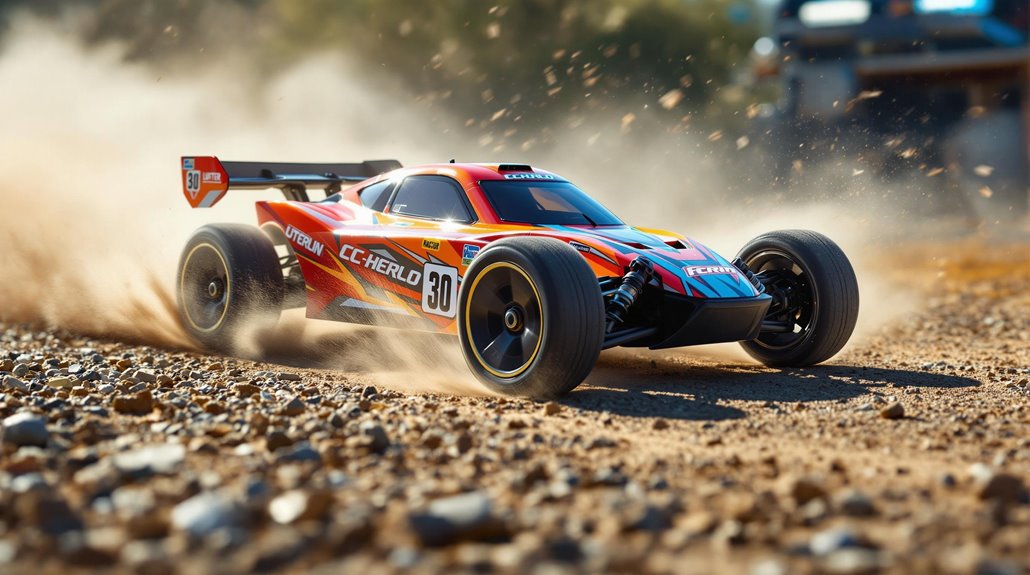
Upgrading your motor and battery is a game-changer for maximizing your RC car's speed. By switching from brushed to brushless motors, you'll notice a speed increase of about 10-15% due to their superior efficiency and power output. Moreover, transitioning to LiPo batteries can significantly enhance your performance, allowing speeds to jump from 35+ mph to 45+ mph in many cases. Electric RC airplanes, similar to RC cars, often feature brushless motors for consistent power delivery and smoother flight. Here are four key points to consider when upgrading motors and batteries:
- Brushless Motors: These motors provide higher efficiency and can handle more power, making them ideal for serious speed enthusiasts.
- LiPo Batteries: With higher discharge rates, these batteries can deliver the energy your car needs to reach top speeds, especially when paired with upgraded motors.
- Voltage Compatibility: The voltage of your battery directly affects the motor's RPM; higher voltage means more speed.
- System Compatibility: Always ensure your upgraded motors and batteries are compatible with your RC car's power system to avoid damage and maximize performance.
With the right upgrades, you can push your RC car's speed to impressive new heights!
Tire Selection and Performance
When it comes to maximizing your RC car's speed and handling, tire selection plays a crucial role. The type of tire you choose can greatly influence both acceleration and top speed. For smooth, flat surfaces, slick tires are your best bet, while spiked tires excel in wet or muddy conditions. If you're looking for versatility, mini spike tires offer decent traction across various terrains while still maintaining reasonable speed. Softer tires often provide better grip, which can lead to improved acceleration when you're racing off the line.
Don't overlook tire pressure; overinflated tires can reduce contact with the ground, resulting in decreased traction and slower speeds. It's essential to find the right balance. Additionally, matching the tire size with your car's gearing setup can enhance both acceleration and top speed. Larger tires may require different gear ratios to perform optimally. By carefully considering your tire selection, you'll set yourself up for success, whether you're racing on a smooth track or tackling rough terrain. Remember, the right tires can make all the difference in your RC car's performance! The fastest RC cars can reach speeds of 325 km/h, though most average RC cars achieve 50-60 km/h, making speed an important consideration.
Nitro vs. Electric Speed
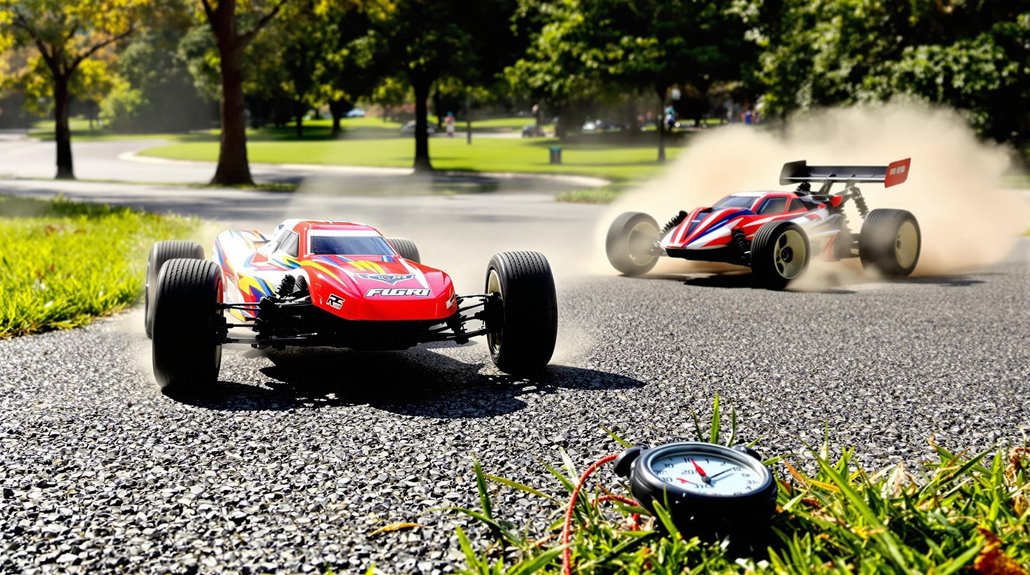
Speed is often the primary consideration for RC car enthusiasts, and the debate between nitro and electric models is a hot topic. Each type has its own strengths when it comes to achieving impressive top speeds. Nitro cars typically reach speeds of 30 to 60 mph, with high-end models exceeding 100 mph after modifications. Electric models, on the other hand, can start as low as 10 mph but high-performance options, like the ARRMA LIMITLESS, can top 150 mph.
Here are four key points to consider:
- Acceleration: Electric cars offer quicker acceleration due to their instant torque.
- Run Time: Nitro engines generally provide longer run times, ideal for extended sessions.
- Maintenance: Electric models require less maintenance, making them beginner-friendly.
- Performance: Brushless motors in electric cars outperform nitro engines in speed and efficiency.
Additionally, many RC monster trucks are designed for various terrains, allowing them to handle challenging surfaces while maintaining speed. Ultimately, the choice between nitro and electric depends on your preferences for speed, convenience, and the type of racing experience you seek. Whether you lean toward the raw power of nitro or the cutting-edge tech of electric, both can deliver thrilling speeds.
Budgeting for Speed Enhancements
For RC enthusiasts looking to boost their car's performance, budgeting for speed enhancements is key. You'll want to start by considering basic upgrades, which can begin around $70, but keep in mind that high-performance engines can cost $200 or more. These expenses can significantly affect your car's speed capabilities.
As you plan your budget, factor in additional components like mufflers, headers, and throttle servos, as they contribute to your overall cost. Transitioning from brushed motors to brushless motors is another effective way to enhance speed and efficiency, but be prepared for a higher price tag due to the complexity involved.
Don't forget about LiPo batteries, essential for achieving those higher speeds. Depending on their capacity and specifications, these batteries can range from $30 to $100, making them a crucial aspect of your speed budgeting. Lastly, regular maintenance and fuel costs shouldn't be overlooked, as they can accumulate over time. By carefully considering these factors, you'll be well on your way to maximizing your RC car's performance without breaking the bank. For those seeking high-quality RC vehicles, brands like Kyosho and Axial offer excellent options that can enhance your racing experience.
Community Experiences and Tips
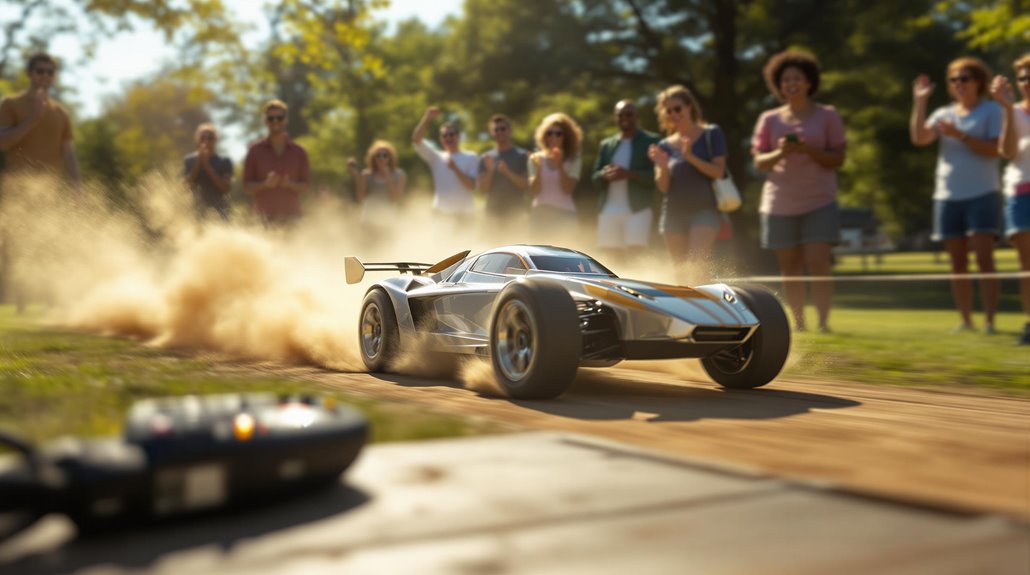
RC car enthusiasts have valuable insights that can help you enhance your vehicle's performance. By tapping into their experiences, you can make informed upgrades that boost your speed. Here are some key tips:
- Upgrade to Brushless Motors: Investing in a brushless motor can significantly improve your speed, with many users reporting a 10-15% increase compared to brushed motors.
- Use LiPo Batteries: Switching to LiPo batteries can enhance your vehicle's acceleration and overall speed due to their higher discharge rates. You'll notice a difference in how your car performs.
- Match Tires to Terrain: Don't overlook the importance of tire selection. Slick tires work best on smooth surfaces, while spiked tires provide better traction in wet conditions. This can affect your speed and handling.
- Modify Gear Ratios: Adjusting gear ratios can be a game changer. A smaller pinion gear improves acceleration, while a larger spur gear can help you reach higher top speeds.
Choosing between electric or nitro RC cars is crucial, as it impacts not only the speed but also the maintenance and running costs. Remember to test your upgrades consistently under similar conditions to accurately measure their impact on your RC car's speed.
Choosing the Right RC Car
Selecting the right car can make all the difference in your RC experience. When you're choosing the right RC car, think about how you plan to use it. Off-road models often prioritize durability over speed, so their top speeds are typically lower than on-road racing cars. If you're a beginner, focus on durability and ease of handling instead of just speed; many fast models need plenty of space to operate effectively.
Evaluate the RC cars' top speed ratings before making a decision. For instance, some models like the ARRMA LIMITLESS can hit speeds over 110 mph, while others might only reach 30-70 mph. Keep in mind that performance varies by model; cars with brushless motors usually provide higher speeds than those with brushed motors. The Traxxas X-Maxx, for example, is capable of hitting speeds over 50 mph and is designed for extreme durability, making it a good choice for challenging terrains.
Lastly, make sure to check battery compatibility. Some RC cars require LiPo batteries to achieve their maximum speed potential, while others work well with both NiMH and LiPo options. By considering these factors, you'll be better equipped to choose the right RC car that meets your needs and offers an exciting experience.

